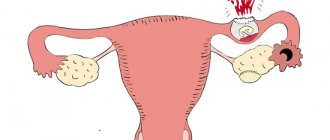Signs of pregnancy with a boy and a girl are a popular topic of conversation among women. After all, you want to immediately choose a name for your unborn child, imagine him as a small, funny, charming toddler with rosy cheeks, in a funny blue or green overalls with cars or in a beautiful bright dress with bows and cherries. Also, when pregnancy has occurred, the signs of a boy or a girl must be taken into account from a practical point of view, in order to stock up on things suitable in color and style in advance, purchase a stroller and other household items. For this purpose, there are various folk signs about the gender of the child, which are difficult to substantiate logically, but, to the surprise of all generations of expectant mothers, they often come true. Perhaps because the probability of a “hit” is rather high - 50%. Here are the most popular of them. So, what are the signs of pregnancy with a boy, and what do doctors think about them?
Physical and mental health
1. Your state of health changes as follows. The palms feel dry. Gives you a fever. Headaches appear. Feet get cold more often. There is increased activity of hair growth on the extremities. This is explained by the fact that during pregnancy with a boy, a woman’s body produces more male sex hormones. However, doctors assure that in most cases, women do not experience any hair growth in the lips, legs, or bikini area, since, regardless of gender When a child is born, the amount of the hormone estrogen increases. On the contrary, unwanted hair may disappear completely before childbirth. And subjective sensations in the form of dry skin and thermoregulation disorders are very common and are associated with changes in metabolism. It makes you feel hot for about the same reason. In addition, almost all expectant mothers in the first weeks of pregnancy periodically rise in body temperature to 37.2-37.4 degrees. Headaches can be associated with a decrease or, conversely, an increase in blood pressure. If a woman does not suffer from migraines, then she definitely needs to measure her blood pressure when a headache occurs. If it turns out to be low, which is not uncommon in the first trimester, you can drink a mug of tea or coffee and do light physical activity. If, on the contrary, it is high, you need to urgently consult a doctor!
2. Signs of pregnancy with a boy in the early stages - absence of nausea and vomiting. That is, toxicosis. Perhaps so... Doctors still have not determined the nature of toxicosis in the first trimester of pregnancy. Some say that this is due to the age of the mother, others with her psychological state. But the women themselves are sure that these are the real signs of pregnancy with a boy, while with a girl, the expectant mother, on the contrary, suffers from toxicosis for a long time.
3. A pregnant woman craves meat dishes, cheese and something sour. Here everything is clear where this sign came from. Men must have great physical strength. And this is impossible without consuming protein products, which include meat, cheese and other animal products. Sour - this speaks of severity of character. Well, sweets are for girls.
4. The shape of the abdomen during pregnancy with a boy is pointed, the waist is visible when viewed from the back. Doctors are definitely against this sign. The shape of the abdomen depends on the length of pregnancy, the size of the fetus, the size of the woman's pelvis, and the position of the baby in the uterus. If it lies across, then there is no talk of any waist. If, as expected, it is longitudinal, then the waist can be visible from the back, but only in a fairly slender expectant mother.
5. A woman becomes more beautiful and attractive. Here, much depends not on the gender of the child being carried, but on the woman herself, or rather, on how carefully she monitors her beauty. Some expectant mothers try to dress fashionably, continue to get their nails done, don’t go out without makeup, and use stretch mark creams. And others forget about themselves, eat a lot, wear large clothes.
6. The expectant mother is in a good mood almost every day if she is carrying a boy. Yes, this is undeniable, especially if she and her husband wanted to give birth to a guy.
7. A boy’s heart, unlike a girl’s heart, beats less than 140 beats per minute. By the way, many gynecologists are sure of this. Heartbeat is determined using obstetric stethoscopes, ultrasound and CTG. But if it is less than 120 beats per minute, this is already a pathology.
8. The tip of the nose becomes sharper. This visual effect can be created due to weight loss, due to weight loss. Regardless of the baby's gender.
9. If dad gains weight, it will be a boy. What patterns there are are unclear.
Magic and numerology
In addition to the above signs, there are various interesting ways, including magical ones, to determine the gender of the unborn child. Here are some of them.
The ring suspended by a thread is held above the left palm. If it moves back and forth, it will be a boy, and if it moves in a circle, it will be a girl.
In many Asian countries, it has long been believed that the gender of the unborn child is influenced only by the ratio of the ages of its parents. You need to divide mom's age by three, and dad's age by four. The child inherits the sex of the child of the one whose remainder is greater.
There is also a kind of fortune telling among the people, by which one can determine that a boy will be born. To do this, the expectant mother must make several simple movements. So, a boy will be born if:
- the expectant mother stretches her arms forward, holding her palms down;
- a pregnant woman will take the door key by the top.
Also, our great-grandmothers believed that if a mother eats only crusts of bread, then a boy will certainly be born. A son will also be born if a pregnant woman uproots a burdock bush.
In addition, our great-grandmothers undertook to predict the gender of the child using numerology. To do this, they wrote on paper the full names, surnames and patronymics of both parents, as well as the month of conception, after which what was written was translated into numbers (each letter corresponds to a specific number). All numbers were summed up until a single number was obtained, and if it was odd, then our ancestors were sure that an heir would be born.
These interesting folk beliefs and methods have been used from ancient times to the present day. But in any case, no matter who is born, the child will be the most wonderful and long-awaited gift to parents. The main thing is that he is a healthy, strong baby.
Women in position are often capricious, this and that are not right for them, and sometimes it is difficult to figure out where they really need help and indulgence, and where not. So now, let’s try to understand this issue, when a woman complains that she is constantly cold during pregnancy. Is this really so, is this possible and how should we approach it?
Yes, it is true that pregnant women may experience a feeling of cold during pregnancy, but this is more the norm than a pathology. This is a kind of response of the body to the emergence of something new in it, a new life-child. It must be said that, however, one should not confuse such things as a real cold, which is accompanied by chills and malaise, and pregnancy. One is different from each other, although during pregnancy there may be a slight increase in temperature and a rather prolonged feeling of severe cold, both in the limbs and other parts of the body.
Thus, it turns out that it is sometimes impossible to figure out where the expectant mother is in normal condition and where she has a cold without the intervention of a specialist, and if there are doubts about this, it is better to go to the hospital.
Why is it cold during pregnancy?
Cold and pregnancy are usually linked together in the first weeks of gestation, when all organs and systems are rebuilt to a new mode of operation. As a rule, women notice a feeling of cold during pregnancy in the period from 2 to 8 weeks, and often this period coincides with the moment when the expectant mother still does not know that she is pregnant. In some cases, pregnant women may feel chills during the first three months as a result of hormonal changes in all organs of the body.
So what happens inside a woman’s body, why is it cold during pregnancy? During pregnancy, the corpus luteum of the ovaries produces a substance that doctors call progesterone. Before pregnancy, it is produced in small quantities, and upon successful conception, its concentration in the blood increases several times, creating a woman a feeling of cold during pregnancy. In other words, progesterone in a significant dose irritates the thermoregulation center in the hypothalamus, thereby causing a slight increase in body temperature and, as a result, chills.
So, if your wife suddenly starts complaining that she is cold during pregnancy, treat her with understanding, because this is true. At the same time, pay attention to how high her body temperature is. If it is more than 37, then you need to think about visiting a doctor. This may be the result of some kind of infection or, for example, a viral disease.
In addition, ask your wife if she has any pain when urinating, since pregnant women often experience cystitis, accompanied by fever and chills. If there is bloody discharge and high blood pressure, then this may indicate various types of intoxication.
Ultimately, if there are chills and there is uncertainty about the condition of the pregnant woman, it is better to consult a gynecologist, undergo an examination and find out for sure the reasons why a woman feels cold during pregnancy.
But, as a rule, in most cases, these are only temporary organic changes that do not entail any serious consequences.
Chills during pregnancy
Cold and pregnancy can also be viewed from another point of view, when a woman is shivering and the temperature is low. This may indicate a number of reasons that caused this: malnutrition, a sharp decrease in the body’s immune defense, low blood sugar, or the reason may be a non-functioning thyroid gland. It is worth noting that all these signs can be the cause of one disease, the name of which is hypothermia.
Be that as it may, there is no need to sound the alarm right away; perhaps in your case one blanket and a few minutes of attention and warmth will be enough and the woman will feel better!
Pregnancy
- this is a special condition, and it is not surprising that women, being pregnant, feel differently than in their normal state. Some people feel hot and stuffy all the time, and the woman opens all the windows even in winter. And someone freezes all the time, wrapping themselves in sweaters and shawls, even if it’s a red summer outside.
The reasons why a pregnant woman may feel cold can be different. One of them is changes in hormonal levels during pregnancy. Typically, the skin maintains a comfortable body temperature thanks to blood capillaries. In women, body temperature fluctuates depending on the level of the hormone estrogen, which is responsible for peripheral blood vessels: the more hormone there is in the blood, the higher the sensitivity of the blood vessels to temperature. Therefore, if a woman begins to feel very cold, without any reason, it is worth considering whether this is pregnancy.
Plays a huge role during pregnancy. When thyroid function decreases during pregnancy, women experience complaints: fatigue and lethargy. This is typical for pregnancy in general. But besides this, some women begin to experience severe chilliness; the pregnant woman constantly freezes - even in the warm season.
If other signs are present - peeling, brittle nails, greasy hair, hair loss, then this indicates problems with the thyroid gland and a decrease in its function. The above signs are sometimes accompanied by a change in the timbre of the voice - it becomes hoarse, deaf, as well as puffiness of the face and swelling in the area. Sometimes the nose gets stuffy, the tongue swells, and teeth marks remain on its side surfaces. All of these signs are signs of hypothyroidism.
What should a pregnant woman do if she constantly feels chilly and feels very cold?
You can try turning to the ancient wisdom of the Chinese. They believed that our well-being largely depends on what kind of food we eat. After all, there are “cold” foods that give off a cold sensation - for example, fruits (but not all) and milk, and there are “hot” foods - bananas, honey, rice. Try to eat accordingly.
In addition, we can and should harden our blood vessels by taking a contrast shower every day. Such a shower not only has a hardening effect on the vessels, but also trains them, making them more elastic and capable. You can also take warm foot baths with sea salt and rosemary oil.
Well, that's a nice moment. There is a folk superstition that tells us that if a pregnant woman is constantly cold and chilly (while other pregnant women are hot), this means that she will give birth to a girl.
Almost immediately after ovulation, every woman planning to have a child should closely monitor her health and the signals that the body sends. Often, a pregnant woman notices that she is shivering, but there is no temperature. This is explained by the fact that before ovulation, basal temperature and progesterone levels increase.
Causes
When a woman is in her normal state, blood vessels are responsible for the warmth of her skin. During pregnancy, the level of the estrogen hormone increases significantly, which naturally affects the sensitivity of the blood vessels, so if at some point a woman begins to notice with surprise that she is feeling hot and cold, it is worth considering whether she is in an interesting position .
It should be noted that there is a decrease in the functional characteristics of the thyroid gland. As a rule, this happens in the early stages. A pregnant woman feels very tired and weak, and performing everyday tasks becomes unbearable for her.
In addition to exhaustion and lethargy, the lower extremities, in particular the feet, may become frozen. Despite its small size, the thyroid gland is responsible for many processes occurring in the body. Its main task is to develop metabolism in cells.
Moreover, the thyroid gland is involved in almost all vital processes of the human body, which include the sensitivity of the skin during pregnancy.
If a young mother notices that her legs have begun to get very cold, she should contact an endocrinologist who can diagnose the cause and then prescribe the correct treatment without harming the fetus.
If the patient has a history of a disease such as vegetative-vascular dystonia, she should be examined again. This disease is different in that its development occurs against a background of nervous tension and stressful situations.
When your feet get too cold during early pregnancy, you should definitely undergo an examination. This may indicate such conditions.
Hemoglobin is reduced . If the lower extremities feel cold, it is possible that the woman has low hemoglobin. In this case, the doctor will prescribe a general blood test.
A sign of low hemoglobin can be not only coldness of the skin, but also their dryness, nails become excessively brittle, hair loss is noticed, severe disturbances in the sense of smell are possible, and food loses its exquisite charm.
Joint diseases . For example, the development of cervical osteochondrosis should not be ruled out. This disease is always accompanied by severe pain in the neck or shoulder area. Painful sensations can especially bother a young mother in the morning. A crunching sound may be heard when you turn your head.
Diseases of the genitourinary system . These include cystitis, inflammation of the ovaries, pyelonephritis, etc.
There can be a huge number of reasons that provoke cold feet, so if the expectant mother notices this property, measures should be taken immediately to identify them. If a serious disease develops in the body, and measures to eliminate it are not taken, serious consequences for the fetus are possible.
Reason to seek medical help
Chills are sometimes a symptom that is characteristic of inflammatory diseases, as well as colds. In most cases, chills during early pregnancy without fever can be a reason to visit a doctor.
- When the temperature rises above 37 0 C, this indicates the occurrence of a viral or infectious disease. Pyrogens are substances produced by microorganisms that affect the thermoregulation center in the hypothalamus, causing increased performance. Often, with chills, a pregnant woman experiences a lack of appetite, dizziness, weakness and drowsiness. As first aid, you should call a doctor. Before his arrival, you should not take medications; it is better to increase your intake of hot drinks.
- If chills are accompanied by sharp pain when urinating, it means that the woman has developed cystitis. In this case, you should not delay visiting a urologist, who will prescribe the necessary therapy.
- The first step when chills occur is to measure your blood pressure. It is often elevated. During arterial hypotension, blood vessels relax. Blood circulation slows down, so it does not have time to deliver heat to the body, and the pregnant woman feels cold. An active lifestyle and a contrast shower are recommended as treatment. Special exercises for pregnant women will help.
- Reduced hemoglobin manifests itself in the following: chills, constant headaches, fatigue, dizziness, pale skin. This condition can lead to oxygen starvation in the fetus. The specialist will prescribe diet therapy and a set of necessary medications.
- If a woman had problems such as vegetative-vascular dystonia before conception, then chills are a normal condition. Problems with the autonomic nervous system create sensations of sudden cold snap. It is important to remain calm, no worries. Rest more often, walk longer. Consult a specialist about taking sedatives.
- Hypothyroidism is manifested by chills, lethargy, peeling skin, lethargy, large amounts of hair loss, and swelling in the face. An endocrinologist can help here.
- If chills during pregnancy are accompanied by bloody discharge and severe pain in the lower abdomen, this indicates detachment of the fertilized egg or placenta. In this case, the patient needs to go to the hospital for further examination and treatment.
Treatment
Chinese sages believed that if you eat right, there will be no health problems. And indeed it is. The human body needs the amount of vitamins and minerals it needs, and proper nutrition will allow you to saturate it with them.
In addition, since ancient times, the Chinese have divided foods into cold and warm. For example, cold foods include vegetables, fruits, milk, kefir, cottage cheese, and eggs. And for warm ones - porridge, bananas, bread products, honey, nuts and many others. By introducing a large amount of warm foods into your diet, you can warm your body.
A contrast shower will help get rid of chilliness in the lower extremities. Of course, you shouldn’t torture your body by dousing it with ice water. To eliminate the cold, it will be enough to perform a contrast shower with hot and slightly cool water.
Hot foot baths with the addition of sea salt and herbs will be no less useful. They will help not only give the lower extremities the necessary warmth, but also relieve swelling, relieve pain, and remove cracked heels.
How to eliminate cold feet
Many women in the early stages of pregnancy feel cold feet, so they often use a warm foot bath to eliminate the discomfort. To warm up faster, you can add a little rosemary oil and sea salt.
A more modern method of influencing unpleasant cold sensations in the legs in the early stages of pregnancy is the use of special devices. For example, with the help of special insoles with a heating effect, you can get rid of this problem forever. Such devices can be ordered on the Internet or purchased in a specialized store. Like shoes, they come in different sizes and qualities. Every pregnant woman can choose the most suitable option for herself.
Diverging slightly from the main topic of the article, we can pay attention to popular beliefs regarding the feeling of chilliness in the legs in the early stages of pregnancy. Popular wisdom says that if a pregnant woman often complains of coldness in her lower extremities, then most likely she is expecting a boy.
Based on all of the above, we can safely say that cold feet during pregnancy should not cause particular concern to the expectant mother, but this symptom should not be left completely unattended. By eliminating the unpleasant sensation using the simple methods listed above, you can remain calm. Another thing is that if nothing helps, you should contact a specialist for a competent examination and prescribe appropriate treatment. It is no secret that careful attention to the health of the expectant mother is the key to a successfully delivered and healthy baby. The more a pregnant woman takes care of her health, the more comfortable the unborn baby will be in the womb.
It is during pregnancy that women truly begin to take care of themselves, value their health, and listen to changes in the body. Sometimes the most insignificant changes or manifestations disturb a mother's heart. For example, a cold stomach during pregnancy. If for experienced mothers this symptom is not an acute problem or emergency, then first-time mothers treat everything with increased anxiety. What can I say – maternal instinct!
Signs
According to traditional healers, if a pregnant woman’s feet are cold, it means she is expecting a boy. Although you can find completely different opinions on Internet sources, statistics lean in favor of this version.
In the process of carrying a baby, a woman can experience enormous stress on her body. This is due to the fact that another person is being formed in her body. The expectant mother may change taste preferences, there is enormous emotional instability, desires alternate at an unimaginable speed, without stopping at one thing, and also a strong iciness of the lower extremities is felt.
Freezing of the feet is considered both a sign of serious diseases occurring in the female body, and an invariable companion of pregnancy. It is precisely the reason that a qualified specialist should identify. Good luck and all the best!
How to care (video)
During pregnancy, every woman experiences many new sensations that are characteristic only of this condition. But it happens that conditions previously known to the body appear. For example: from time to time a woman may experience hot flashes or, conversely, cold flashes, and sometimes these sensations are characteristic of individual parts of the body. Each pregnancy is individual, so it is impossible to say that this or that sensation is characteristic of a certain stage of pregnancy. For example: when your feet are cold during pregnancy, this does not mean that you need to wear more socks and sweaters. This sensation may occur even if the temperature of the entire body is within normal limits. Freezing feet are especially common in the early stages of pregnancy. Why does this happen and how to deal with unpleasant cold in your feet?
Feet get cold during pregnancy
Pregnancy is a special condition. It is not surprising that women feel differently when they are pregnant. Some people feel hot all the time, while others experience constant cold, regardless of the number of sweaters and shawls they wear.
The most common complaint from many pregnant women is that their feet are mostly cold. Even when the overall body temperature is normal, the legs feel unpleasantly cold. We will tell you what this phenomenon is connected with and how to get rid of it in this article.
Why do my feet freeze?
There are several reasons why a pregnant woman may have cold feet. Let's consider each of them separately.
Change in hormone levels. Under normal conditions, the skin is able to maintain normal body temperature with the help of blood capillaries. A woman's temperature can experience fluctuations that depend on the level of estrogen in the blood. As you know, it is responsible for the vessels of the periphery, that is, temperature sensitivity directly depends on the estrogen level - the more there is, the higher the level of sensitivity. That is why freezing feet is considered one of the first precursors of pregnancy in females, with good reason.
Thyroid gland: functional decline. It is this organ that plays a very important role during pregnancy. As a rule, due to decreased thyroid function, women complain of fatigue. These two symptoms are characteristic of pregnancy in general. But, excluding the above-mentioned manifestations, many women also feel chilliness, which mainly makes itself felt in the leg area. This happens even during warm periods. Therefore, if you have problems with the thyroid gland, consult a doctor. He will make the correct diagnosis and prescribe the appropriate medications for you.
Source
The appearance of chills without fever: cause during pregnancy
Chills during pregnancy without fever may indicate various disorders in the body.
In particular, such as
:
- Malnutrition;
- Low blood sugar;
- A sharp decrease in immunity;
- Problems with the thyroid gland.
In this case, the woman shakes very much, and there are also other signs of malaise. All these signs may indicate the presence of hypothermia in the body. In this case, it is advisable to undergo an examination of the whole body to determine the main cause of the disorder, and, if necessary, comprehensive, competent treatment.
Frozen pregnancy in the early stages
Non-developing pregnancy
(intrauterine fetal death, frozen pregnancy) - the death of an embryo or fetus without obvious signs of termination of pregnancy. Unfortunately, this can happen to every woman and at any stage of gestation, but this does not mean that subsequent pregnancies will have complications (unless this is a repeated case).
information Fading of pregnancy in the early stages of development occurs most often. The critical time frame for a non-developing pregnancy (NP) is most often before 8 weeks of gestation. It is at this time that all organs and tissues are formed, so any pathological factor can disrupt the development of the fetus and lead to its death.
The consequences of NB in the early stages both for the woman’s body and for her psychological state are less than if it happened during the period when the mother already felt movement. In any case, you should not dwell on what happened and be afraid of a subsequent pregnancy. Try to treat this as natural selection of nature.
Causes
Unfortunately, even modern medicine is not always able to answer why a child died in utero. There are many reasons, but it is not always possible to get to the truth. Moreover, in the early stages the law applies: “all or nothing.” This means that under the influence of unfavorable factors, the embryo either tolerates them and develops further correctly, or dies.
Most often, a frozen pregnancy in the early stages occurs due to a genetic breakdown of the embryo itself, which occurred at one or another stage of its development. The fetus is simply not viable, so it is rejected. This is a kind of natural selection.
Another common cause of NB is infection. Most often this is the herpes simplex virus and various respiratory
Source
Cold and pregnancy
Women in position are often capricious, this and that are not right for them, and sometimes it is difficult to figure out where they really need help and indulgence, and where not.
So now, let’s try to understand this issue, when a woman complains that she is constantly cold during pregnancy. Is this really so, is this possible and how should we approach it? Yes, it is true that pregnant women may experience a feeling of cold during pregnancy, but this is more the norm than a pathology. This is a kind of response of the body to the emergence of something new in it, a new life-child. It must be said that, however, one should not confuse such things as a real cold, which is accompanied by chills and malaise, and pregnancy. One is different from each other, although during pregnancy there may be a slight increase in temperature and a rather prolonged feeling of severe cold, both in the limbs and other parts of the body.
Thus, it turns out that it is sometimes impossible to figure out where the expectant mother is in normal condition and where she has a cold without the intervention of a specialist, and if there are doubts about this, it is better to go to the hospital.
Cold and pregnancy are usually linked together in the first weeks of gestation, when all organs and systems are rebuilt to a new mode of operation. As a rule, women notice a feeling of cold during pregnancy in the period from 2 to 8 weeks, and often this period coincides with the moment when the expectant mother still does not know that she is pregnant. In some cases, pregnant women may feel chills during the first three months as a result of hormonal changes in all organs of the body.
So what happens inside a woman’s body, why is it cold during pregnancy? During pregnancy, the corpus luteum of the ovaries produces a substance that doctors call progesterone. Before pregnancy, it is produced in small quantities, and during
Source
Pregnancy symptoms
Using the expression “ pregnancy symptoms ” is not entirely correct, since pregnancy is a natural physiological state for a woman, and not a disease with certain symptoms. But this formulation has taken root both among doctors and expectant mothers, so we will use it.
Early pregnancy symptoms
A woman can guess her situation from the very first symptom of pregnancy
- this is
a delay
, that is,
the cessation of menstruation
. True, if menstruation is delayed, you should not immediately suspect that you are pregnant. After all, it is quite possible that this is the result of climate change, the consequences of some illness or stress.
In addition, some women have irregular cycles, and then periodic disruptions are likely. Be that as it may, consult a doctor, let him examine you and determine the cause of the delay in menstruation.
What to do if it's cold during pregnancy?
If a pregnant woman feels chills, then the first thing to do is to rule out the presence of pathologies. The course of action should initially be as follows:
- Take your temperature. If it is elevated, visit your doctor immediately. He will determine the cause of this and prescribe appropriate treatment.
- Measure your blood pressure. Elevated blood pressure is unacceptable in pregnant women. You need to notify your doctor about this. He will take action and prescribe appropriate medications.
- Pay attention to your condition during pregnancy in general. Is there any paleness of the skin? What hair and nails look like. Is there any discomfort in the area of any organs? If something is wrong, also rush to the doctor.
- Think about whether you have problems with your spine. If this is an exacerbation of osteochondrosis, let your gynecologist know about it and visit a vertebrologist or neurologist.
- Consult an endocrinologist, cardiologist, or therapist.
- Take general blood, urine, and stool tests. Check your hormone levels.
Along with the treatment that specialists will prescribe for a pregnant woman, the woman must help herself. You need to pay attention to your diet. You need to eat well, hunger is excluded. Drink warm milk and tea. Stop drinking alcohol and smoking.
Warm insoles and socks will help keep your feet warm. You can buy special insoles that come with heating. They can be found in pharmacies or ordered through an online store. They are put into any shoes - sneakers, shoes, sneakers, boots. Your feet will always be warm.
Signs of pregnancy with a boy. Who will be born: “symptoms” and signs for pregnant women
Having experienced the first joy of the news of pregnancy, every mother begins to speculate who will be born, looking for all sorts of signs of pregnancy with a boy or the appearance of a girl, studying various signs for pregnant women. Many parents simply long for the birth of a son, and therefore burn with impatience waiting for the gender of the baby to become known. For those impatient, we will tell you what signs there are of a boy during pregnancy, and according to the results of an ultrasound, and not only, and how to find out whether a boy or a girl will join the family.
More and more mothers are trying to plan the gender of their child
, and not find out after the fact.
Therefore, mothers who are keen to have a son, when planning a pregnancy, carefully study various methods of conceiving a boy
.
A very interesting way of planning for menstruation, for example, is to have significant sexual intercourse 11-12 days before the onset of menstruation. This is due to the greater mobility of male sperm. According to some scientists, this method is reliable in 87% of pregnancies, provided that the woman has a strictly regular monthly cycle. Well, if you missed a good moment, and a little miracle is already growing and developing inside, then it’s time to study the scientific signs of pregnancy with a boy, check folk signs for pregnant women who will be born, and figure out ways to find out whether a boy or a girl
will join the family. So let's get started.
If you kept a temperature calendar in advance ( monitoring basal temperature
), recording the readings and calculating
the days of ovulation
, then with a high degree of probability you can find out
Source
Feet get cold during pregnancy. Causes.
The causes of freezing lie in changes in the functioning of internal organs: blood vessels, thyroid gland. The blood supply to the fetus and placenta requires the mother's circulatory system to redistribute blood flow. In addition, the stress on the body during pregnancy also affects the sensitivity of the skin. The expectant mother feels either hot or cold.
Experts advise contacting an endocrinologist. You need to get examined and find out if everything is okay. Feet get cold during pregnancy for various reasons:
- low hemoglobin - a diet that includes foods that increase the level of hemoglobin in the blood will help. In addition to freezing feet during pregnancy, the condition of the nails worsens, dry skin appears, and hair falls out. These symptoms can also be partially reduced through diet;
- cervical osteochondrosis. Additional symptoms are pain in the neck and shoulder area. When moving the head, a crunching sound is possible. It hurts more often in the morning;
- pathologies of the genitourinary system. Feet freeze with cystitis, inflammation of the genital organs, pyelonephritis.
Any disease requires treatment. Only a specialist can select it; you should not self-medicate during pregnancy. The mother is responsible for the child. There is no need to panic in advance and start looking for strong medications. Incorrectly selected medications can cause serious fetal illness and premature birth.
Why are my feet cold?
Everyone knows that you need to keep your feet warm since childhood, but what to do if your feet are constantly cold and you can’t cope with this problem on your own?
Feet are cold: reasons
There are many reasons why your feet may be cold. This may be caused by poor-quality shoes, the habit of dressing too lightly in the cold season, a peculiarity of the person’s constitution, or internal diseases.
Most often, the feet get cold in women from 15 to 45 years old , this is due to the hormonal characteristics of the body and the habit of the fair sex to pay more attention to beauty rather than to the practicality and thermal insulation properties of shoes. Older people often face this problem - after 50 years, most of them have hormonal imbalances, develop one or more diseases of the vascular system, and the body is affected by many predisposing factors, such as excess weight, smoking and poor diet.
1. If your feet only get cold outside or in certain conditions, then most likely the culprit is too light or tight shoes, incorrectly selected clothing and other similar reasons. In such cases, feet get cold only in the cold season and only outside the house - as soon as you come home and put on warm slippers, all problems immediately disappear;
2. It is much more difficult if your feet are cold all the time, even in a warm room, and no warm shoes or woolen socks can save the situation. Constantly freezing feet are a sign of poor circulation in the lower extremities and it is necessary to find out exactly what is causing it.
1. Vegetative-vascular dystonia - with this disease, the normal innervation of blood vessels changes, the speed of blood flow in the vessels decreases and capillary blood flow is disrupted
Source
Useful information for your success every day: we develop personal and professional qualities, follow fashion, harmoniously combine career with relationships, family, motherhood
Article protected by copyright and related rights. When using or reprinting material, an active link to the site is required!
Pregnancy brings many changes to a woman’s body, starting from the first days. Therefore, for many, a positive pregnancy test is only confirmation that they have already begun to feel these changes, that their body has already signaled the beginning of a new life, and the delay is only an expected logical consequence.
First signs of pregnancy before delay
Malaise. Very many women at the very beginning of pregnancy may experience malaise, which they mistake for a cold. This is due to an increase in body temperature in the first trimester of pregnancy. A woman gets tired quickly, so a feeling of soreness may occur. Although at this time a woman may indeed become slightly ill due to the ongoing decrease in immunity. The main thing in such cases is not to treat yourself with antibiotics, which are contraindicated during pregnancy. It is best to turn to folk remedies.
Increased breast sensitivity. This symptom most often appears one to two weeks after conception. A woman’s breast reacts to literally every touch, swells, hurts, sometimes to such an extent that it is impossible to touch it. There are also opposite situations when women do not feel their breasts during pregnancy and are surprised that they do not hurt before the expected arrival of menstruation, as is usually the case. In any case, if your breasts hurt, the cause may not only be pregnancy.
Minor bleeding. It may not be
Feeling cold or chills during pregnancy – when is it normal?
You've probably already studied the symptoms that await you in the first trimester of pregnancy. But there is another less common one that is missing from most lists on the Internet.
Are you constantly freezing without understanding why? Have you tried everything you can to stay warm, but it doesn't help much? In fact, most of the many possible causes of feeling cold during pregnancy are completely safe. Although sometimes this can be one of the first signs of some serious problems and complications.
Therefore, if you feel cold or chills constantly, then you should consult a doctor soon, as this may indicate a serious problem. Constantly feeling cold is a sign of hypothyroidism, caused by an underactive thyroid gland.
What does the feeling of “chills” and “coldness” mean in this article?
First, let’s make sure that we are talking about exactly the symptom whose description you were looking for.
When we mention “chills” here, we are not talking about a cold or the high body temperature that a thermometer tells you. It's about how you feel. That is, trembling and coldness in the body, which is often described with the words “I’m freezing.”
And when the article talks about the “feeling of cold,” it is a general feeling of well-being, not a sensation to the touch. Some women feel warm (hot flashes) during pregnancy, while others feel cold all the time.
Is it normal to feel cold during pregnancy?
You may have heard that changes in body temperature are a normal part of pregnancy, but most women feel warmer, not colder.
This happens because your metabolism speeds up during pregnancy, and increased hormone levels can cause temperature fluctuations. But the much higher prevalence of feeling warm doesn't mean feeling cold is a bad thing. There are certain reasons why you may feel cold, and many of them are completely harmless.1
5 main reasons
In most cases, feeling cold is a response to some of the other normal pregnancy changes happening in your body. This is often related to hormones, especially in the early stages, but there are also a number of other reasons.
But there are a number of other reasons.
Hormonal changes
Fluctuations in hormone levels during pregnancy are one of the main reasons for feeling cold and chilly. Although this usually makes women feel warmer, it can also have the opposite effect.
A sudden increase in progesterone and estrogen levels, especially in the early stages, makes you sweat and feel quite hot.
As a result, the body tries to cool itself by speeding up its breathing rate and pumping more blood, and when it does this too much, you become cold.
This is one possible reason for feeling cold in the first trimester, and some women may experience this feeling more strongly than others.2
Anemia
Many pregnant women suffer from iron deficiency, which can cause anemia, a lack of healthy red blood cells in the blood that can affect circulation.
Red blood cells carry oxygen, and a lack of oxygen can cause certain body functions to slow down and make you feel cold. If you are anemic, you may also feel dizzy and weak, but because you are pregnant, it can be difficult to know for sure whether these are symptoms of anemia or an effect of the pregnancy itself.
Toxicosis
If you are suffering from nausea due to morning sickness, it is likely interfering with your normal appetite. Nutrition is important, and without food consumption your body has nothing to convert into energy. Consequently, a lack of calories can lead to shivering as the body struggles to stay warm.
Infections
It's possible that even the simplest infection can make you feel cold and chilly. The cause may be a urinary tract infection (UTI), a kidney infection, a respiratory infection, or some other infection.
High basal temperature
During the early stages of pregnancy, a woman's basal body temperature rises and remains high for at least 2 weeks. This may make you feel like your surroundings are cold. And the chills you feel are similar to those that accompany a cold, and therefore you may also feel hot.2
What can be done?
Feeling cold during pregnancy is not a serious problem, but it should not be ignored. To relieve it and chills, you need to keep your body warm. Try these tips to help you feel better:
Wear warm clothes
If you are constantly cold, wear warm clothes. Put on a jacket or wrap a blanket around you. You can even wear an extra pair of socks if your feet get cold. Warming your feet will warm your body.
Take a rest
Feeling cold during pregnancy will lead to fatigue. Therefore, it is important to get enough rest during this period. Sit on your bed, wrap yourself in a blanket, read a good book, and eventually you will fall asleep. If you don't like to read, just turn on soothing music and try to fall asleep.
Take iron supplements
If you feel cold due to anemia, then you need to take iron supplements. Your diet should also consist of foods rich in this element. Eating this way will cure anemia and improve your metabolism, which in turn will help you feel warmer.
Eat healthy foods
Sometimes the cause of cold during pregnancy is a lack of proper nutrition. Therefore, during pregnancy, food should be healthy and nutritious. Consuming ginger and root vegetables (spinach, beans, potatoes, broccoli, etc.) helps the body produce heat3, so be sure to add them when cooking.2 1
An environment that is too hot or cold during pregnancy can increase the chances of premature birth, according to a large American study.
However, excessive cold had the greatest effect during the first seven weeks of pregnancy.
4 A Japanese study found that pregnant women, especially those who are underweight (BMI less than 18.5), should avoid cold temperatures in mid-to-late pregnancy, as this may affect the baby's height and birth weight5.
5 diseases that can cause chills during pregnancy
Below are some rarer medical conditions that cause chills during pregnancy, including early pregnancy:
Hypothyroidism
Feeling cold is a symptom of hypothyroidism, which occurs when the thyroid gland does not produce enough hormones. Hypothyroidism is rare during pregnancy, and if not treated promptly, it can increase the baby's risk of miscarriage, premature birth, low birth weight, and even learning disabilities in the baby's future.
Urinary tract infection
A urinary tract infection is caused by bacteria entering and multiplying in the urinary tract, which is accompanied by inflammation and is a common cause of chills during pregnancy. According to some scientific estimates, the prevalence of the symptomatic course of this disease among pregnant women was about 17.9%, and the asymptomatic form - in 13%6.
This infection is not a serious problem if it is treated properly and you drink enough fluids.
However, without timely treatment, it can reach your kidneys and lead to serious unwanted complications such as pyelonephritis, sepsis and premature birth.
Some of the common symptoms of a UTI include pelvic pain, cloudy urine with a foul odor, a strong urge to urinate, and a burning sensation while urinating.
Viral gastroenteritis
Viral gastroenteritis, also known as stomach flu and rotavirus, is a viral intestinal infection. The main reason is the consumption of contaminated food and water.
Watery diarrhea, nausea and vomiting are the main symptoms, and chills along with fever may also occur. Diarrhea and vomiting during pregnancy can lead to dehydration, which can cause contractions and premature labor.
Some other symptoms of viral gastroenteritis are dizziness, weakness and fainting.
Flu and ARVI
We all suffer from the flu or ARVI at some point. This is accompanied by chills, fever, cough, and sometimes nausea and vomiting. During pregnancy, the likelihood of contracting the flu is increased due to a weakened immune system.
And if you suspect such an infection, you should consult a doctor as soon as possible.
He or she will likely advise you to drink plenty of warm fluids and rest to prevent worsening symptoms and avoid serious complications during pregnancy.
Listeriosis
Listeriosis is a bacterial infection caused by consuming contaminated food and water. Pregnant women with weak immune systems are also at risk of contracting it.
Common symptoms include fever, diarrhea, nausea and muscle pain. If listeriosis is left untreated, it can affect your pregnancy.
Miscarriage, stillbirth, premature birth and infection in the newborn are some of the complications associated with it.2
Is feeling cold a symptom of pregnancy?
This article suggests that feeling cold may be one of the first signs of pregnancy. In fact, there is some truth in this. Although more often women say that they noticed a feeling of heat before a delay in menstruation.
The reason you may feel cold is because your metabolism is in a state of increased overdrive from the hormonal fluctuations mentioned above. So, it is possible that if you notice changes in temperature in your body, then you might be pregnant.1
Feeling cold during pregnancy, or rather in the early stages, can make you feel anxious. But this will only make the situation worse, so try to determine the reason behind it - be it due to body temperature or a cold. See your doctor and follow his advice.
Pregnancy is a time when you should eat healthy, read pregnancy books, and enjoy the attention while you get it. So try to relax and seek medical help when necessary.
Loading…
Causes of freezing
If a pregnant woman is constantly cold, her feet are cold, there are several reasons for this. Let's look at them in more detail.
- Game of hormones. After successful fertilization, complete hormonal changes begin. Temperature fluctuations are due to changes in estrogen levels. He is responsible for blood vessels. Often pregnancy can be suspected precisely by constant trembling.
- Thyroid dysfunction. With the onset of an interesting situation, women may notice some chills and weakness. This is often associated precisely with a decrease in thyroid function. Other symptoms may also occur: dryness and flaking of the skin, peeling of the nail plates, dullness and brittle hair.
- Hypothyroidism. In this case, the pregnant woman will not only feel cold, but also notice that her voice has changed, her face is swollen, her nose is often stuffy, her tongue has become enlarged, and the condition of her hair, nails and skin has changed for the worse.
- Vegetovascular dystonia. Problems of this kind arise in pregnant women due to constant stress, excessive emotionality, after serious infectious diseases, and in the presence of physical inactivity. Often the pathology simply gets worse, as it is a chronic disease.
- Osteochondrosis. If such a disease exists, then the woman may also have cold feet. In this case, there will be pain in the corresponding place, numbness of the limbs, etc. Before the planned conception, it is recommended to undergo treatment and systematically perform therapeutic exercises.
- Low hemoglobin. The pathology is characterized by chilliness, pale skin, and weakness. It is detected in pregnant women using a laboratory blood test.
- High blood pressure. With hypertension, a person immediately feels chilly. Such manifestations occur periodically in pregnant women. At moments when blood pressure rises.
- Diseases of the genitourinary system and others. Accompanied by a rise in temperature. At temperatures above 37 degrees, any person feels cold. Easy to check. Just take a thermometer and place it under your arm. Often it is acute respiratory diseases that cause a rise in temperature. In this case, it is not difficult to notice a runny nose and cough. Under no circumstances should you treat yourself. Only a doctor can find the right and harmless medicine.










